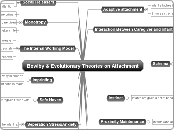Bowlby & Evolutionary Theories on Attachment
Socail Releasers
Behavior such as smiling, crying etc
Designed to get caregiver's attention
Adaptive attachment
Infant attaches itself to caregiver for resources
Ensures species survival
Interaction Between Caregiver and Infant
Without interaction attachment is not ensured
Needed for survival
Infants will not form bonds through stress or pain releif, a carer has to be consistant to win attachment
Monotropy
Child develops a heirarchy of caregivers with one primary
Based on care given
Proven to be utter shite
Schema
Packets of information contained in the memory
Childs schema of caregiver:
Gives Food
Gives Affection
Gives Shelter
Gives Protection
The Internal Working Model
A set of expectations developed by the infant's attachment to its caregiver
Tells the infant if it can rely on its caregiver to give it support in times of stress etc
Also effects future attachments and effects how the infant or adult will react in socail situations
Instinct
Infants are given a set of behaviours that are designed to call the mother to its side:
Crying
Mimicking
Laughter
Imprinting
Infants are naturally inclined to help caregivers in everyday scenario's
Infants will try to engage socailly with the caregiver to ensure a tight bond is made
Proximity Maintenance
Infants (and adults) will keep close to people who they are attached to
Safe Haven
Returning back to the caregiver if faced with:
Fear
Stress
Danger
Secure Base
The caregiver has a proximity where the infant is safe to explore the surrounding area
Often shown when the infant checks to see if caregiver is still within close proximity when exploring nearby area's
Seperation Stress/Anxiety
Discomfort is shown when the infant is:
Taken away from the carer
Carer ignores the infant
Critical Period
A certain time in the infants childhood where strong bonds are much more likely to take place
